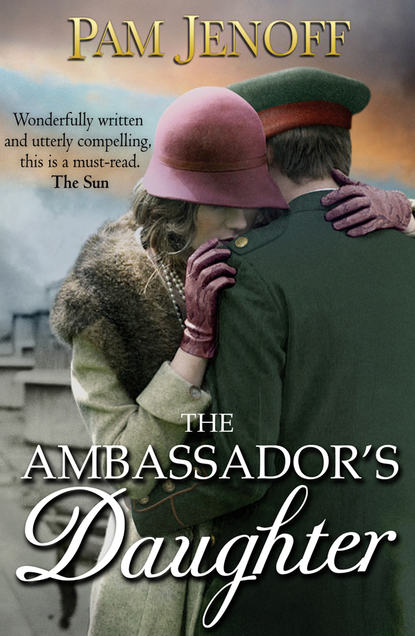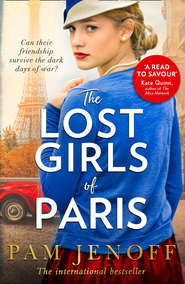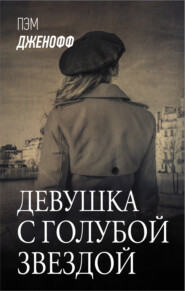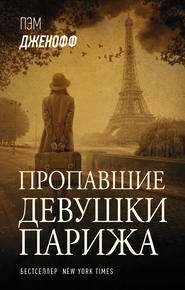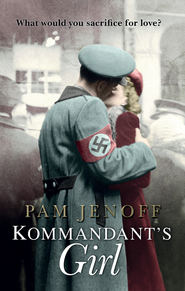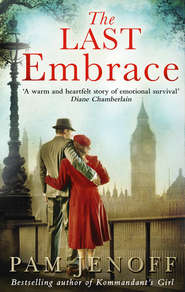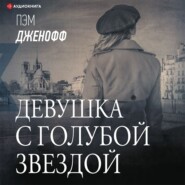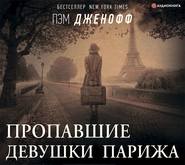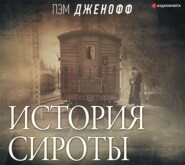По всем вопросам обращайтесь на: info@litportal.ru
(©) 2003-2024.
✖
The Ambassador's Daughter
Настройки чтения
Размер шрифта
Высота строк
Поля
The Ambassador's Daughter
Pam Jenoff
NEW YORK TIMES BESTSELLING TITLE THE ORPHAN'S TALE OUT NOWParis, 1919The nation’s leaders have gathered to rebuild the world from the ashes of The Great War. But for one woman, the City of Light harbours dark secrets and dangerous liaisons Brought to the peace conference by her German Diplomat father, Margot resents being trapped in Paris where she is still looked upon as the enemy.Yet returning to Berlin means a life with the wounded fiancé she barely knows. Torn between duty and the desire to be free, Margot strikes up unlikely alliances: with Krysia, a musician who protects a secret; and with Georg, the handsome, damaged naval officer who makes Margot question where her true loyalties should lie.Against the backdrop of one of the most significant events of the century, a delicate web of lies obscures the line between the casualties of war and of the heart, making trust a luxury that no one can afford.THE STUNNING PREQUEL TO THE BESTSELLING NOVEL, KOMMANDANT’S GIRL, HERALDED A ‘BREATHTAKING DEBUT’ BY PUBLISHERS WEEKLY‘Wonderfully written and utterly compelling, this is a must-read’ – The SunPraise for Pam Jenoff:‘ heartbreakingly romantic story of forbidden love during WW2’ – Heat‘Must read’ – Daily Express
Praise for the author
Quill Award Nominee
‘This is historical romance at its finest.’
—Publishers Weekly on Kommandant’s Girl
‘In her moving first novel, Jenoff offers an insightful portrait of people forced into an untenable situation and succeeds in humanizing the unfathomable as well as the heroic.’
—Booklist
‘Poignant and intense’
—Good Book Guide on The Diplomat’s Wife
‘Jenoff explores the immediate aftermath of World War II with sensitivity and compassion, shedding light on an often overlooked era of European history. She expertly draws out the tension and illustrates the danger and poverty of Eastern Europe as it falls under communism. Highly recommended for all fiction collections.’
—Library Journal on The Diplomat’s Wife
‘… well constructed and a real page turner.’
—Birmingham Jewish Weekly on The Diplomat’s Wife
About the Author
PAM JENOFF is the author of several novels, including the international bestseller Kommandant’s Girl, which also earned her a Quill Award nomination. Along with a bachelor degree in International Affairs from George Washington University and Master’s degree in History from Cambridge, she received her Juris Doctor from the University of Pennsylvania and previously served as a Foreign Service Officer for the US State Department in Europe, as the Special Assistant to the Secretary of the Army at the Pentagon and as a practising attorney. Pam lives with her husband and three children near Philadelphia where, in addition to writing, she teaches law school.
Also byPam Jenoff
KOMMANDANT’S GIRL
THE DIPLOMAT’S WIFE
The
Ambassador’sDaughter
Pam Jenoff
In loving memory of Dad
Acknowledgments
The Ambassador’s Daughter represents joy on so many levels to me. First, it gave me the chance to return to some of my beloved characters and themes from Kommandant’s Girl, something that I—and many of my readers—have been hoping would happen for several years. It also allowed me to explore Europe after the First World War, an era that has fascinated me since I wrote about it in my thesis at Cambridge nearly two decades ago. Writing a story in this era required extensive research about historical events as well as the social and political climate at the time. As always when writing historical fiction, I had to make some judgment calls about when to remain historically accurate and when to “bend” history, melding fact and fiction for the sake of story (a creative indulgence for which I hope my readers will forgive me).
This book brought me back to the incomparable publishing team at HQ, including my wonderful editor, Susan Swinwood, and the many brilliant folks in editorial, marketing, publicity and sales, and Kim Young and the marvelous team at HQ. I am so grateful for your time and talents, and overjoyed to be working with you again! Big thanks as always to my agents Scott Hoffman and Michelle Brower at Folio Literary Management for all of your keen insight and tireless work on my behalf. Thanks also to my colleagues at Rutgers for your interest and support.
Even as it is joyous, writing this book has been bittersweet. When I began The Ambassador’s Daughter, a book that examines among other things the parent-child relationship, I had no idea that my own beloved father would not be here to see the finished project. With each book I always recognize the “village” that makes my writing life possible. However, this time I need to express even more deeply my gratitude for those closest to me: my husband, Phillip, mother, Marsha, brother, Jay, as well as my in-laws Ann and Wayne, dear friends, and of course, the three little muses who sustain and inspire me every day, Benjamin, Charlotte and Elizabeth. I love you all.
PROLOGUE
The sun has dropped low beneath the crumbling arches of Lehrter Bahnhof as I make my way across the station. A sharp, late-autumn breeze sends the pigeons fluttering from the rafters and I draw my coat closer against the chill. The crowds are sparse this Tuesday evening, the platforms bereft of the usual commuter trains and their disembarking passengers. A lone carriage sits on the track farthest to the right, silent and dark.
I had been surprised by the telegram announcing Stefan’s return by rail. There were hardly any trains since the Allies had bombed the lines. At least that’s what the newspapers write—the defunct trains and the British naval blockade are the excuses given for everything, from the lack of new pipes to start the water running again—a problem that has forced us back outside as though it were a century ago—to the impossibility of getting fresh milk. Looking around the desolate station now, I almost believe the excuse.
Stefan’s face appears in my mind. It was more than four years ago on this very platform that we said goodbye, the garland of asters I’d picked hung freshly around his neck. “Don’t go,” I pleaded a final time. Stefan was not cut out to fight—he had a round, gentle face, wide brown eyes that said he could never hurt anybody. But it was too late—he had gone down to the enlistment center two weeks earlier, ahead of any conscription, and come home with papers ordering him to report. The war was going to be quick, everyone said. The horse-mounted Serbs, with their swords, were no match for the Kaiser’s tanks and planes. The fighting would be over in weeks, and all of the boys wanted a piece of the glory before it was gone.
I peer back over my shoulder past the closing kiosk, which gives off the smell of stale ersatz coffee, at the station doors, creaking open and closed with the wind. Someone more important than me should have been here to meet Stefan. He is a soldier, wounded in battle. More to the point, he is the only young man from our Jewish enclave in Berlin who had gone off to fight and come back at all. I don’t know what I expected, not a marching band and reporters exactly, but perhaps a small delegation from the local war council. The once-proud veterans’ group had been disbanded, though. No one wanted to be identified as a soldier now, to face the glares of reproach and the questions about why they had not gotten the job done.
Fifteen minutes pass, then twenty. I clutch tighter the fine leather gloves that I’ve managed to twist into a damp, wrinkled ball. Fighting the urge to pace, I start toward the station office to inquire if there is news of the next arrival. I navigate around a luggage trolley, which has been upended and abandoned midstation. My skirt catches on something and I pause, turning to free the hem. It is not a nail or board, but a filthy, long-haired man sitting on the ground, a fetid mass of bandages where his right leg had once been.
“Bitte …” a voice rasps as I jump backward. “I’m sorry to startle you.” He is a soldier, too, or was, his tattered uniform barely recognizable. I fish a coin from my purse, trying not to recoil from the hand that reaches out for it. But inwardly, I blanch. Will Stefan look like this sorry creature?
I lift my head as a horn sounds long and low from the darkness beyond the edge of the station. A moment later a train appears, threading its way onto one of the tracks. It moves so slowly that it seems to have no engine at all, nudged instead by some slight tilt of the earth. Great clouds of steam billow from its funnel, filling the station. As I walk toward the platform, straining to see through the mist, my heart begins to pound.
The train grinds to a halt. The doors open with painstaking slowness and a few men spill out, some in uniform and others street clothes. I search those walking toward me for Stefan, knowing that he will not be among them.
When the platform has nearly cleared, a nurse pushes a wheelchair from one of the train carriages. I step forward, and then stop again. The chair does not contain Stefan, but an elderly man, hunched over so only the top of his bald head shows. The nurse struggles with the chair and as its rear wheels catch on the door, I hasten to help her.
The man in the chair uncurls, straightening slightly as I near. It is Stefan, I realize, biting my lip so hard I taste blood. A giant slash across the right side of his face from temple to chin combines with the lack of hair to make him almost unrecognizable. But the worst part is his arms, skeletal and shaky. My mind races as I try to fathom the horrors that could age a man decades in a few years.
Stefan gazes up with vacant, watery eyes, not speaking. “Hello, darling,” I manage, bending to brush my lips against his papery cheek.
He reaches for me with a quivering hand. “Let’s go home,” he croaks, and as his fingers close around my wrist like cold death, I let out the cry I can hold back no longer.
My eyes fly open and I sit up in the darkness, still screaming.
PART ONE Paris, December 1918
1
I cycle through the Jardin des Tuileries, navigating carefully around the slippery spots on the damp gravel path. The December air is crisp with the promise of snow and the bare branches of the chestnut trees bow over me like a procession of sabers. I pedal faster past the park benches, savoring the wind against my face and opening my mouth to gulp the air. A startled squirrel darts behind the base of a marble statute. My hair loosens, a sail billowing behind me, pushing me farther and faster, and for a moment it is almost possible to forget that I am in Paris.
The decision to come had not been mine. “I’ve been asked to go to the peace conference,” Papa informed me unexpectedly less than a month ago. He had previously professed no interest in taking part in “the dog and pony show at Versailles,” and had harrumphed frequently as he read the details of the preparations in the Times. “Uncle Walter thinks …” he added, as he so often did. I did not need to listen to the rest. My mother’s older brother, an industrialist who had taken over the electronics firm their father founded, could not attend the peace conference himself after contributing so much to the war machine. He considered it important, though, to somehow have a voice at the table, a presence before the Germans were formally summoned. So he had secured an invitation for Papa, an academic who had spent the war visiting at Oxford, to advise the conference. It was important to be there before Wilson’s ship arrived, Papa explained. We packed up our leased town house hurriedly and boarded a ferry at Dover.
Papa had not been happy to come, either, I reflect, as I reach the end of the park and slow. The street is choked thick with motorcars and lorries and autobuses, and a few terrified horses trying to pull carriages amid the traffic. He had pulled forlornly on his beard as we boarded the train in Calais, bound for Paris. It was not just his reluctance to be torn from his studies at the university, immersed in the research and teaching he loved so, and thrust into the glaring spotlight of the world’s political stage. We are the defeated, a vanquished people, and in the French capital we loved before the war, we are now regarded as the enemy. In England, it had been bad enough. Though Papa’s academic status prevented him from being interned like so many German men, we were outsiders, eyed suspiciously at the university. I could not wear the war ribbon as the smug British girls did when their fiancés were off fighting, because mine was for the wrong side. But outside of our immediate Oxford circle it had been relatively easy to fade into the crowd with my accentless English. Here, people know who we are, or will, once the conference formally begins. The recriminations will surely be everywhere.
My skirts swish airily as I climb from the bike, thankfully free of the crinolines that used to make riding so cumbersome. The buildings on the rue Cambon sparkle, their shrapnel-pocked facades washed fresh by the snow. I stare up at the endless apartments, stacked on top of one another, marveling at the closeness of it all, unrivaled by the most crowded quarters in London. How do they live in such spaces? Sometimes I feel as though I am suffocating just looking at them. Growing up in Berlin, I’m no stranger to cities. But everything here is exponentially bigger—the wide, traffic-clogged boulevards, square after square grander than the next. The pavement is packed, too, with lines of would-be customers beneath the low striped awning of the cheese shop, and outside the chocolatier where the sign says a limited quantity will be available at three o’clock. A warm, delicious aroma portends the sweets’ arrival.
A moment later, I turn onto a side street and pull the bike up against the wall, which is covered in faded posters exhorting passersby to buy war bonds. A bell tinkles as I enter the tiny bookshop. “Bonjour.” The owner, Monsieur Batteau, accustomed to my frequent visits, nods but does not look up from the till.
I squeeze down one of the narrow aisles and scan the packed shelves hungrily. When we first arrived in Paris weeks earlier, it was books that I missed the most: the dusty stacks of the college library at Magdalen, the bounty of the stalls at the Portobello Road market. Then one day I happened upon this shop. Books had become a luxury few Parisians could afford during the war and there were horrible stories of people burning them for kindling, or using their pages for toilet paper. But some had instead brought them to places like this, selling them for a few francs in order to buy bread. The result is a shop bursting at the seams with books, piled haphazardly in floor-to-ceiling stacks ready to topple over at any moment. I run my hand over a dry, cracked binding with affection. The titles are odd—old storybooks mix with volumes about politics and poetry in a half-dozen languages and an abundance of war novels, for which it seems no one has the stomach anymore.
I hold up a volume of Goethe. It has to be at least a hundred years old, but other than its yellowed pages it is in good condition, its spine still largely intact. Before the war, it would have been worth money. Here, it sits discarded and unrecognized, a gem among the rubble.
Pam Jenoff
NEW YORK TIMES BESTSELLING TITLE THE ORPHAN'S TALE OUT NOWParis, 1919The nation’s leaders have gathered to rebuild the world from the ashes of The Great War. But for one woman, the City of Light harbours dark secrets and dangerous liaisons Brought to the peace conference by her German Diplomat father, Margot resents being trapped in Paris where she is still looked upon as the enemy.Yet returning to Berlin means a life with the wounded fiancé she barely knows. Torn between duty and the desire to be free, Margot strikes up unlikely alliances: with Krysia, a musician who protects a secret; and with Georg, the handsome, damaged naval officer who makes Margot question where her true loyalties should lie.Against the backdrop of one of the most significant events of the century, a delicate web of lies obscures the line between the casualties of war and of the heart, making trust a luxury that no one can afford.THE STUNNING PREQUEL TO THE BESTSELLING NOVEL, KOMMANDANT’S GIRL, HERALDED A ‘BREATHTAKING DEBUT’ BY PUBLISHERS WEEKLY‘Wonderfully written and utterly compelling, this is a must-read’ – The SunPraise for Pam Jenoff:‘ heartbreakingly romantic story of forbidden love during WW2’ – Heat‘Must read’ – Daily Express
Praise for the author
Quill Award Nominee
‘This is historical romance at its finest.’
—Publishers Weekly on Kommandant’s Girl
‘In her moving first novel, Jenoff offers an insightful portrait of people forced into an untenable situation and succeeds in humanizing the unfathomable as well as the heroic.’
—Booklist
‘Poignant and intense’
—Good Book Guide on The Diplomat’s Wife
‘Jenoff explores the immediate aftermath of World War II with sensitivity and compassion, shedding light on an often overlooked era of European history. She expertly draws out the tension and illustrates the danger and poverty of Eastern Europe as it falls under communism. Highly recommended for all fiction collections.’
—Library Journal on The Diplomat’s Wife
‘… well constructed and a real page turner.’
—Birmingham Jewish Weekly on The Diplomat’s Wife
About the Author
PAM JENOFF is the author of several novels, including the international bestseller Kommandant’s Girl, which also earned her a Quill Award nomination. Along with a bachelor degree in International Affairs from George Washington University and Master’s degree in History from Cambridge, she received her Juris Doctor from the University of Pennsylvania and previously served as a Foreign Service Officer for the US State Department in Europe, as the Special Assistant to the Secretary of the Army at the Pentagon and as a practising attorney. Pam lives with her husband and three children near Philadelphia where, in addition to writing, she teaches law school.
Also byPam Jenoff
KOMMANDANT’S GIRL
THE DIPLOMAT’S WIFE
The
Ambassador’sDaughter
Pam Jenoff
In loving memory of Dad
Acknowledgments
The Ambassador’s Daughter represents joy on so many levels to me. First, it gave me the chance to return to some of my beloved characters and themes from Kommandant’s Girl, something that I—and many of my readers—have been hoping would happen for several years. It also allowed me to explore Europe after the First World War, an era that has fascinated me since I wrote about it in my thesis at Cambridge nearly two decades ago. Writing a story in this era required extensive research about historical events as well as the social and political climate at the time. As always when writing historical fiction, I had to make some judgment calls about when to remain historically accurate and when to “bend” history, melding fact and fiction for the sake of story (a creative indulgence for which I hope my readers will forgive me).
This book brought me back to the incomparable publishing team at HQ, including my wonderful editor, Susan Swinwood, and the many brilliant folks in editorial, marketing, publicity and sales, and Kim Young and the marvelous team at HQ. I am so grateful for your time and talents, and overjoyed to be working with you again! Big thanks as always to my agents Scott Hoffman and Michelle Brower at Folio Literary Management for all of your keen insight and tireless work on my behalf. Thanks also to my colleagues at Rutgers for your interest and support.
Even as it is joyous, writing this book has been bittersweet. When I began The Ambassador’s Daughter, a book that examines among other things the parent-child relationship, I had no idea that my own beloved father would not be here to see the finished project. With each book I always recognize the “village” that makes my writing life possible. However, this time I need to express even more deeply my gratitude for those closest to me: my husband, Phillip, mother, Marsha, brother, Jay, as well as my in-laws Ann and Wayne, dear friends, and of course, the three little muses who sustain and inspire me every day, Benjamin, Charlotte and Elizabeth. I love you all.
PROLOGUE
The sun has dropped low beneath the crumbling arches of Lehrter Bahnhof as I make my way across the station. A sharp, late-autumn breeze sends the pigeons fluttering from the rafters and I draw my coat closer against the chill. The crowds are sparse this Tuesday evening, the platforms bereft of the usual commuter trains and their disembarking passengers. A lone carriage sits on the track farthest to the right, silent and dark.
I had been surprised by the telegram announcing Stefan’s return by rail. There were hardly any trains since the Allies had bombed the lines. At least that’s what the newspapers write—the defunct trains and the British naval blockade are the excuses given for everything, from the lack of new pipes to start the water running again—a problem that has forced us back outside as though it were a century ago—to the impossibility of getting fresh milk. Looking around the desolate station now, I almost believe the excuse.
Stefan’s face appears in my mind. It was more than four years ago on this very platform that we said goodbye, the garland of asters I’d picked hung freshly around his neck. “Don’t go,” I pleaded a final time. Stefan was not cut out to fight—he had a round, gentle face, wide brown eyes that said he could never hurt anybody. But it was too late—he had gone down to the enlistment center two weeks earlier, ahead of any conscription, and come home with papers ordering him to report. The war was going to be quick, everyone said. The horse-mounted Serbs, with their swords, were no match for the Kaiser’s tanks and planes. The fighting would be over in weeks, and all of the boys wanted a piece of the glory before it was gone.
I peer back over my shoulder past the closing kiosk, which gives off the smell of stale ersatz coffee, at the station doors, creaking open and closed with the wind. Someone more important than me should have been here to meet Stefan. He is a soldier, wounded in battle. More to the point, he is the only young man from our Jewish enclave in Berlin who had gone off to fight and come back at all. I don’t know what I expected, not a marching band and reporters exactly, but perhaps a small delegation from the local war council. The once-proud veterans’ group had been disbanded, though. No one wanted to be identified as a soldier now, to face the glares of reproach and the questions about why they had not gotten the job done.
Fifteen minutes pass, then twenty. I clutch tighter the fine leather gloves that I’ve managed to twist into a damp, wrinkled ball. Fighting the urge to pace, I start toward the station office to inquire if there is news of the next arrival. I navigate around a luggage trolley, which has been upended and abandoned midstation. My skirt catches on something and I pause, turning to free the hem. It is not a nail or board, but a filthy, long-haired man sitting on the ground, a fetid mass of bandages where his right leg had once been.
“Bitte …” a voice rasps as I jump backward. “I’m sorry to startle you.” He is a soldier, too, or was, his tattered uniform barely recognizable. I fish a coin from my purse, trying not to recoil from the hand that reaches out for it. But inwardly, I blanch. Will Stefan look like this sorry creature?
I lift my head as a horn sounds long and low from the darkness beyond the edge of the station. A moment later a train appears, threading its way onto one of the tracks. It moves so slowly that it seems to have no engine at all, nudged instead by some slight tilt of the earth. Great clouds of steam billow from its funnel, filling the station. As I walk toward the platform, straining to see through the mist, my heart begins to pound.
The train grinds to a halt. The doors open with painstaking slowness and a few men spill out, some in uniform and others street clothes. I search those walking toward me for Stefan, knowing that he will not be among them.
When the platform has nearly cleared, a nurse pushes a wheelchair from one of the train carriages. I step forward, and then stop again. The chair does not contain Stefan, but an elderly man, hunched over so only the top of his bald head shows. The nurse struggles with the chair and as its rear wheels catch on the door, I hasten to help her.
The man in the chair uncurls, straightening slightly as I near. It is Stefan, I realize, biting my lip so hard I taste blood. A giant slash across the right side of his face from temple to chin combines with the lack of hair to make him almost unrecognizable. But the worst part is his arms, skeletal and shaky. My mind races as I try to fathom the horrors that could age a man decades in a few years.
Stefan gazes up with vacant, watery eyes, not speaking. “Hello, darling,” I manage, bending to brush my lips against his papery cheek.
He reaches for me with a quivering hand. “Let’s go home,” he croaks, and as his fingers close around my wrist like cold death, I let out the cry I can hold back no longer.
My eyes fly open and I sit up in the darkness, still screaming.
PART ONE Paris, December 1918
1
I cycle through the Jardin des Tuileries, navigating carefully around the slippery spots on the damp gravel path. The December air is crisp with the promise of snow and the bare branches of the chestnut trees bow over me like a procession of sabers. I pedal faster past the park benches, savoring the wind against my face and opening my mouth to gulp the air. A startled squirrel darts behind the base of a marble statute. My hair loosens, a sail billowing behind me, pushing me farther and faster, and for a moment it is almost possible to forget that I am in Paris.
The decision to come had not been mine. “I’ve been asked to go to the peace conference,” Papa informed me unexpectedly less than a month ago. He had previously professed no interest in taking part in “the dog and pony show at Versailles,” and had harrumphed frequently as he read the details of the preparations in the Times. “Uncle Walter thinks …” he added, as he so often did. I did not need to listen to the rest. My mother’s older brother, an industrialist who had taken over the electronics firm their father founded, could not attend the peace conference himself after contributing so much to the war machine. He considered it important, though, to somehow have a voice at the table, a presence before the Germans were formally summoned. So he had secured an invitation for Papa, an academic who had spent the war visiting at Oxford, to advise the conference. It was important to be there before Wilson’s ship arrived, Papa explained. We packed up our leased town house hurriedly and boarded a ferry at Dover.
Papa had not been happy to come, either, I reflect, as I reach the end of the park and slow. The street is choked thick with motorcars and lorries and autobuses, and a few terrified horses trying to pull carriages amid the traffic. He had pulled forlornly on his beard as we boarded the train in Calais, bound for Paris. It was not just his reluctance to be torn from his studies at the university, immersed in the research and teaching he loved so, and thrust into the glaring spotlight of the world’s political stage. We are the defeated, a vanquished people, and in the French capital we loved before the war, we are now regarded as the enemy. In England, it had been bad enough. Though Papa’s academic status prevented him from being interned like so many German men, we were outsiders, eyed suspiciously at the university. I could not wear the war ribbon as the smug British girls did when their fiancés were off fighting, because mine was for the wrong side. But outside of our immediate Oxford circle it had been relatively easy to fade into the crowd with my accentless English. Here, people know who we are, or will, once the conference formally begins. The recriminations will surely be everywhere.
My skirts swish airily as I climb from the bike, thankfully free of the crinolines that used to make riding so cumbersome. The buildings on the rue Cambon sparkle, their shrapnel-pocked facades washed fresh by the snow. I stare up at the endless apartments, stacked on top of one another, marveling at the closeness of it all, unrivaled by the most crowded quarters in London. How do they live in such spaces? Sometimes I feel as though I am suffocating just looking at them. Growing up in Berlin, I’m no stranger to cities. But everything here is exponentially bigger—the wide, traffic-clogged boulevards, square after square grander than the next. The pavement is packed, too, with lines of would-be customers beneath the low striped awning of the cheese shop, and outside the chocolatier where the sign says a limited quantity will be available at three o’clock. A warm, delicious aroma portends the sweets’ arrival.
A moment later, I turn onto a side street and pull the bike up against the wall, which is covered in faded posters exhorting passersby to buy war bonds. A bell tinkles as I enter the tiny bookshop. “Bonjour.” The owner, Monsieur Batteau, accustomed to my frequent visits, nods but does not look up from the till.
I squeeze down one of the narrow aisles and scan the packed shelves hungrily. When we first arrived in Paris weeks earlier, it was books that I missed the most: the dusty stacks of the college library at Magdalen, the bounty of the stalls at the Portobello Road market. Then one day I happened upon this shop. Books had become a luxury few Parisians could afford during the war and there were horrible stories of people burning them for kindling, or using their pages for toilet paper. But some had instead brought them to places like this, selling them for a few francs in order to buy bread. The result is a shop bursting at the seams with books, piled haphazardly in floor-to-ceiling stacks ready to topple over at any moment. I run my hand over a dry, cracked binding with affection. The titles are odd—old storybooks mix with volumes about politics and poetry in a half-dozen languages and an abundance of war novels, for which it seems no one has the stomach anymore.
I hold up a volume of Goethe. It has to be at least a hundred years old, but other than its yellowed pages it is in good condition, its spine still largely intact. Before the war, it would have been worth money. Here, it sits discarded and unrecognized, a gem among the rubble.





